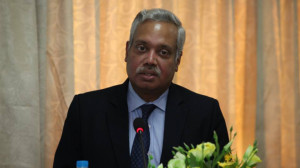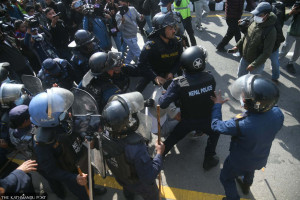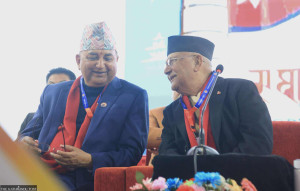National
Fringe Morcha forces worried about being overshadowed
With some influential Madhesi politicians looking to secure long-term electoral interests of their parties in revising the federal boundaries, many smaller forces in the plains appear apprehensive as they fear a new deal on boundaries might give unfair advantage to some Tarai parties instead of serving the larger interest of the Madhesi people.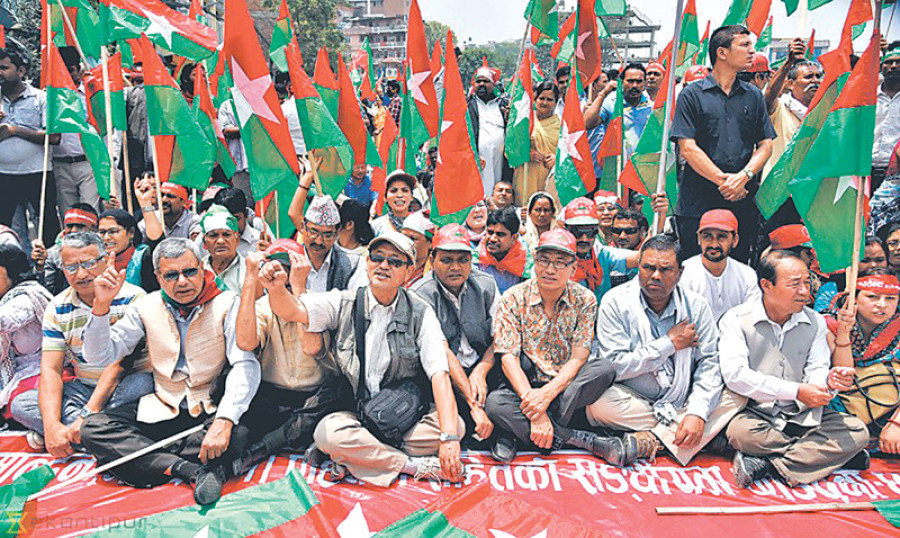
Roshan Sedhai
With some influential Madhesi politicians looking to secure long-term electoral interests of their parties in revising the federal boundaries, many smaller forces in the plains appear apprehensive as they fear a new deal on boundaries might give unfair advantage to some Tarai parties instead of serving the larger interest of the Madhesi people.
The parties insist that all the concerned political parties, irrespective of their size, should be included in the negotiation process, instead of redrawing the lines on the map behind closed doors.
Fringe parties in the Samyukta Loktantrik Madhesi Morcha (SLMM) which have been excluded from informal negotiation with major parties, have expressed their fear of possible gerrymandering by a handful of powerful politicians and warned of disowning any agreement that “does not serve the larger interest of the Madhesi communities”. Among SLMM’s seven affiliates, top guns of only three parties represent the Morcha in informal negotiations with major parties to sort out the contentious issues of the constitution including the federal restructuring.
“We have no problem as long as the revised boundaries serve the larger interests of Madhes. But what if the revision gives unfair advantage to some powerful parties over others?” asked a Morcha leader, adding that the major parties might seek to end the row over boundaries by serving the electoral interests of some big forces.
Morcha’s fringe allies are increasingly suspicious of their powerful allies for not maintaining transparency of their meetings with the governing parties. Only the representatives of the Sanghiya Samajbadi Forum Nepal, the Tarai Madhes Loktantrik Party and the Sadbhawana Party have been discussing agendas with the top leaders of the governing parties.
“We are not obliged to take ownership of the agreement made without our representation. Those involved in informal negotiations will put forward a draft sooner or later for approval. We are free to support or oppose it,” said Anil Kumar Jha, chairman of the Sanghiya Sadbhawana Party.
Fringe parties in the Morcha were taken by surprise when Prime Minister Pushpa Kamal Dahal last week revealed that the government had reached an informal understanding with some Madhesi leaders on key disputed issues.
Morcha top guns said that the smaller parties could not be included in the informal meetings but said they would be consulted once there is a progress in the talks. Despite holding several rounds of informal talks, the government and major parties are still unsure about a breakthrough.
But TMLP Chairman Mahantha Thakur said that the discussions have been encouraging so far.
“There has been an understanding to resolve four issues pertaining to language, representation in the Upper House, boundaries and citizenship. But we are nowhere near agreement. We are waiting for them to make a common position on the disputed issues,” Thakur told the Post. He is hopeful of an early resolution to the crisis in view of what the SLMM believes “sincerity demonstrated by the government at the negotiating table”.
Addressing an event organised to celebrate the first anniversary of constitution promulgation on Monday, PM Dahal said that the government was working seriously to address the concerns of the Madhesi, Tharu and ethnic communities by amending the constitution. During informal negotiations held in the past few weeks, the parties are discussing multiple proposals to resolve the row over boundaries, the major bone of contention. But the proposals fall short of completely addressing the concerns of the Madhesi parties.
In one proposal, though PM Dahal has offered to carve out another province by taking the plains from Nawalparasi to Bardiya, he appears reluctant to touch the disputed districts.
Some Madhesi parties are likely to accept the proposal with reservations as it will give them electoral advantage over other parties.
Despite the official demand of two provinces in the plains, Morcha allies have differing priorities and expectations from a boundary revision. Influential leaders of the ruling parties and the main opposition CPN-UML appear equally careful about secure their electoral interests.
The TMLP leadership has made the western Tarai its core constituency and is working relentlessly to expand the party’s base in the western plains. Critics believe it was the reason the party held its first general convention in Ramgram of Nawalparasi instead of Birgunj, Janakpur or Biratnagar. The party’s choice of venue is understandable considering that it won three seats from Rupandehi and Kapilvastu in 2012.
TMLP heavyweights including its Vice-chairman Hridayesh Tripathi and General Secretary Sarvendra Nath Shukla, who are from the region, are convinced that the party can compete with the national parties in the region where the presence of other regional parties is relatively weaker.
Except for the MJF-Loktantrik, other Madhes-based parties have relatively less influence in the region.
The MJF-L, headed by Bijay Gachhadar, a prominent Tharu face, has long-term electoral interests in the region considered a Tharu stronghold. But since major parties hesitate to incorporate the Tharu-majority areas of Kailali, critics are sceptical about the influences the MJF-L might have in the province. The party had won two seats from Kailali in the last CA polls.
SSFN Chairman Upendra Yadav has bigger aspirations although his prime interest lies in the central and eastern Tarai, where the little known Madhesi Janadhikar Forum had phenomenal victory following the first Madhes Andolan.
Yadav’s absence may delay deal
Sanghiya Samajbadi Forum-Nepal (SSF-N) Chairman Upendra Yadav is leaving for England on a week-long visit on Thursday. Yadav’s absence is likely to cause further delay in the formal negotiations between the government and agitating parties. Yadav is the coordinator the Sanghiya Gathabandhan, an alliance of Madhesi and Janajati parties protesting against the constitution. SSFN Co-chair Rajendra Shrestha said Yadav is leaving for the UK to attend a programme of party’s foreign wing. “But it won’t affect negotiations,” he said. (PR)




 9.12°C Kathmandu
9.12°C Kathmandu


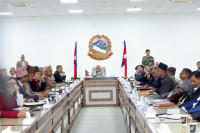



.jpg&w=200&height=120)

